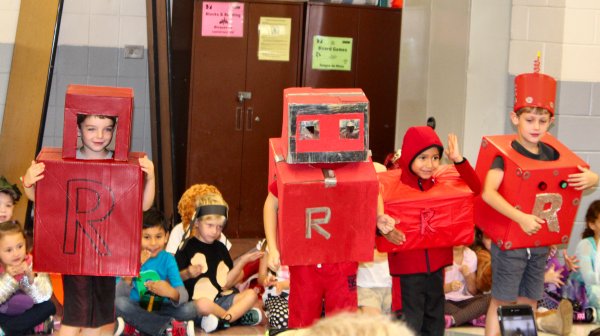Davie County Schools Implement Heggerty to Support Phonemic Awareness
By Jeanna Baxter White
“Deep,” says Susan Shepherd to her first-graders.
“Deep,” they repeat.
“Replace the /p/ with /l/,” she says.
“Deal,” shouts her students.
Shepherd is guiding her students through their daily Heggerty Phonemic Awareness lesson. Phonemic awareness is the ability to understand that spoken words are made up of individual sounds called phonemes, and it’s one of the best early predictors for reading success.
Recognizing the importance of phonemic awareness as a foundational reading skill, Davie County Schools (DCS) in Mocksville, North Carolina, adopted the curriculum this year as part of DavieLEADS (Literacy Empowers All in Davie to Succeed), its five-year early literacy initiative funded by a $2.5 million grant from the Mebane Foundation to improve kindergarten readiness and increase third-grade reading proficiency.
Phonemic awareness builds what DavieLEADS Literacy Coach Amy Spade calls “the parking place for phonics.”
If a child cannot hear that “man” and “moon” begin with the same sound or cannot blend the sounds /s/ /u/ /n/ into the word “sun,” he or she may have great difficulty connecting sounds with their written symbols and the ability to decode words. Without phonemic awareness, phonics makes little sense.
Engaging in phonemic awareness instruction develops students’ understanding of sounds, which also directly impacts their reading, spelling, and writing.
Examples of Phonemic Awareness Skills include
- Blending: What word am I trying to say? Mmmmm…aaaaaaaa…n.
- Segmentation (first sound isolation): What is the first sound in man? /m/
- Segmentation (last sound isolation): What is the last sound in man? /n/
- Segmenting Phonemes: What are all the sounds you hear in man? /m/ /a/ /n/
“As the LEADS team worked with curriculum leaders in the county looking at DCS K-1 students’ data, the team saw a need to increase core instruction in phonemic awareness. After attending training, doing research, and talking with literacy leaders from around the state, we chose Heggerty because it is really intentional, but also easy to implement. Thanks to its explicit and systematic approach, teachers are able to complete the lessons in just 10-12 minutes a day. Everything we’ve heard so far has been positive and teachers are saying they are already seeing a difference,” said Spade.
“The preschool component of Davie LEADS collaborates with the elementary component to ensure vertical alignment of curriculum from preschool to kindergarten,” explained Stephanie Nelson, LEADS preschool collaborative teacher. “After Amy Spade and Renee Hennings-Gonzalaz (LEADS literacy coaches) shared their kindergarten data and the idea of using Heggerty, we were interested immediately. Preschool data from the Cognitive ToyBox assessment games showed that preschool students needed more instruction in rhyme, which is one component of Heggerty. Even though we didn’t have data to support other phonemic areas, we saw that the curriculum could support teachers in creating explicit, multisensory, and systematic phonemic awareness instruction.”
Each level of the Heggerty program provides 35 weeks of daily lessons, focusing on eight phonological awareness skills, along with two additional activities to develop letter and sound recognition, and language awareness.
Daily lessons teach early, basic, and advanced phonemic awareness skills such as:
- Rhyming
- Onset fluency
- Isolating final or medial sounds
- Blending and segmenting compound words, syllables, and phonemes
- Adding, deleting, and substituting compound words, syllables, and phonemes
The program is now used in more than 7,250 school districts across the country.
DCS introduced the curriculum at the end of the 2019-2020 school year as a pilot program in four pre-K and five kindergarten classes two weeks before schools closed and remote instruction began in March. Despite the pilot program’s short duration, the response was so positive that Heggerty was introduced into all kindergarten and first-grade classes in August, all NC pre-K classes in December, and was added to select second-grade classrooms based on student need.
Phonemic Awareness Benefits Reading, Writing, and Spelling
“As teachers, we like that it is written in an easy-to-use format and we aren’t having to come up with these activities on our own,” said Shepherd, who teaches first-grade at Cornatzer Elementary School. “I would tell other schools looking at the program that it is easy to implement and not a lot of extra work on the teacher, but it is a really effective program.”
Based on the benefits she saw while piloting the program, Shepherd even recorded Heggerty videos at least twice a week during remote learning so that families would have the option to continue using the program if they wanted to.
“In the past, we’ve done phonemic awareness activities but not to the level that this program offers. I have been doing a lot of research about reading and how children learn to read and it appears phonemic awareness is one of the missing pieces for struggling readers. If you think about the building blocks of reading, it’s the first step they need to learn before they move on to other reading skills. I think this program will provide the solid foundation our children need from the beginning.”
She commented that many struggling readers have difficulty spelling which also translates into their writing. Heggerty is helping to resolve those issues as well. “If you can’t hear every sound in a word you aren’t going to be able to spell and write as well. There are eight skills we do every day. Sometimes we are segmenting words and then we are blending them back together and then we are taking off sounds and then adding sounds and switching sounds in words. This also helps them in reading.”
Jill O’Toole, a pre-K teacher at Pinebrook Elementary School who also piloted the program, said, “It has given me a quick way to incorporate several key phonemic awareness activities into one short lesson that keeps the children engaged. I see that the repetition gives them confidence in what they are doing and gives them many chances to succeed.”
Josey Redinger, who teaches pre-K at Central Davie, has seen significant improvement in the area of rhyming, specifically, when comparing data from last school year to the current school year. “I understand that this greatly benefits my students in the future when they are beginning reading in kindergarten!”
As a 28-year teaching veteran, Shady Grove Elementary Kindergarten Teacher Traci Richardson has seen programs come and go, but says Heggerty is proving to be worth keeping.
“I like the way it provides a quick and easy way to teach phonemic awareness skills to my students each day. It has also helped me to detect early on if my students are struggling in the different reading areas and allows me to address those weaknesses when I break my students up into small groups.”
She is impressed by the way her students have connected with the program. “Heggerty uses hand motions for many of the different areas like making a roller coaster motion with their hand to isolate the medial sound in a word. As my students are learning to read this year, I’ve noticed many of them applying the strategies they’ve learned and using the hand motions to help them sound out or blend a word.”
“Children in kindergarten learn through structure and repetition and Heggerty provides that in each lesson. My students know every day what to expect and they are used to the routine. Repetition is key for foundational reading skills for 5 and 6-year-old kids and these oral and auditory word games are laying that foundation.”
Combating and Preventing Learning Gaps

After training and implementation occurred in the fall of 2020, the teachers noted that they love the way the program is combating learning gaps caused by the sudden transition to remote learning and hopefully preventing new ones.
“I really, really like this program,” said Nikki Whiteheart who teaches first grade at Cooleemee Elementary. “It has helped fill in a lot of gaps we’ve noticed that kids are having with being able to identify sounds and manipulate the sounds in words. Because they are now used to hearing the sounds in words and are better able to sound them out, they are better at reading and writing as well.”
“Even if last year and this year had been typical school years I think Heggerty would have helped fill in gaps but with these students having to suddenly transition to virtual kindergarten it has been doubly helpful. Heggerty has been great all around. I am very grateful to our school system for seeing our childrens’ needs and finding a program that will meet them.”
Tina Dyson, who teaches kindergarten at William R. Davie Elementary, is equally impressed with the curriculum. “To see these kids and where they started kindergarten and where they are now has been amazing, and it is all because of the Heggerty program!”
“I started the year with 21 students and maybe four of them could say the alphabet. I had to take a step back. Many of my students didn’t get to finish preschool. They were just getting into the meat of Letterland and alphabet recognition when we transitioned to remote learning.”
“Thanks to a combination of Heggerty and Letterland, all of my students can now say the alphabet, recognize the letters, and blend and segment sounds. This week they wrote sentences. I don’t think they could have done that without the Heggerty lessons and that background. We started with little chunks and now we’ve really built something here in March. If a five or six-year-old can do this, imagine what would happen if the program was carried over across the grades?”
Students Find Heggerty Fun and Engaging
Beyond the academic benefits, all of the teachers interviewed said their students find Heggerty fun and engaging and look forward to their daily lesson.
“We start our day with breakfast and morning meeting and then my students are so excited because it is Heggerty time,” said Dyson. “I’ve heard them say ‘This is my Show What I Know Time!!’ They watch as I turn the pages of the manual and when I reach the third page they are asking me ‘are we on the last part already?’ Through the daily repetition, they’ve come to know the program so well that if I forget to do a hand motion, they are quick to point it out to me.”
She teaches her lessons on Google Meet so that children who are out for the day have the option to participate in both Heggerty and Letterland. “They never want to miss Heggerty or Letterland!” she said with a laugh. Parents who have observed a Google Meet lesson have been equally enthusiastic. “I’ve had parents stick their head in the screen and make comments like they can’t believe what they are seeing and hearing!”
I had the pleasure of observing one of the lessons on Google Meet and had to agree. I watched the students wiggle in their seats as they eagerly waited for the start of the lesson and then was amazed by their enthusiasm and focus as they mimicked the hand motions and completed each word exercise.
Dyson added, “I wish there had been a way to document where we started with Heggerty from day one until now, but what I do see is their happy eyes.”




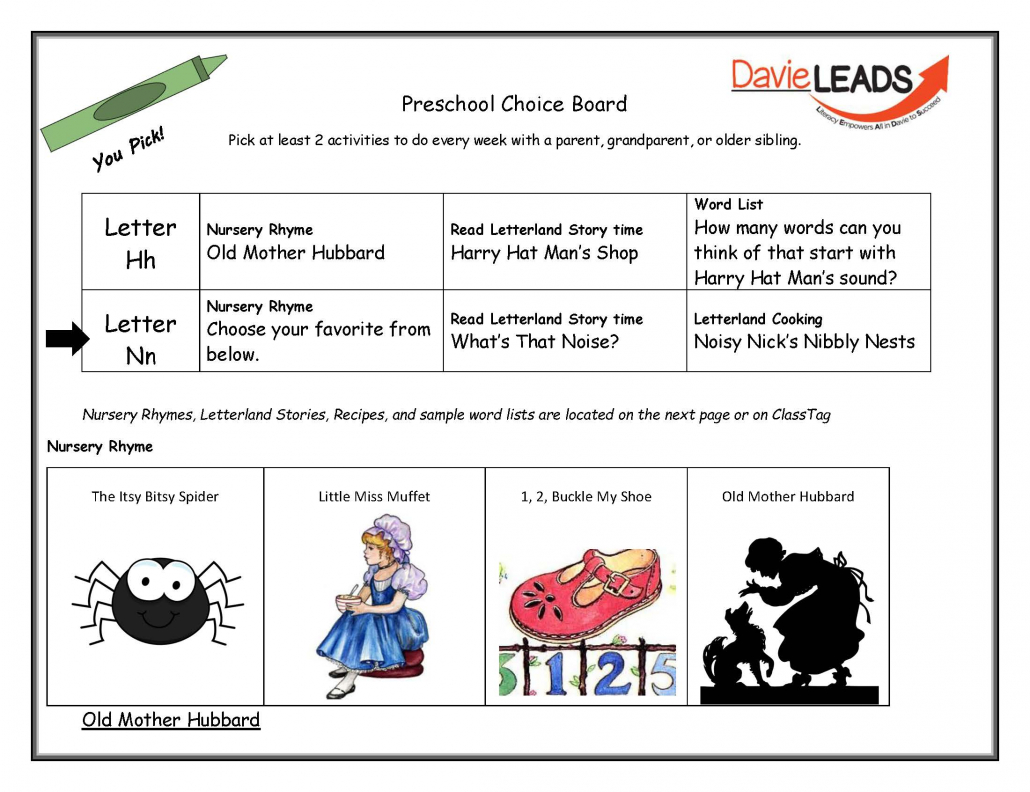

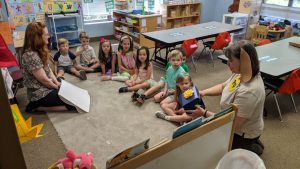
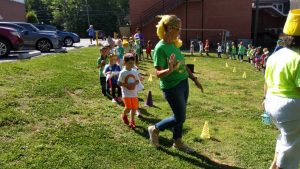


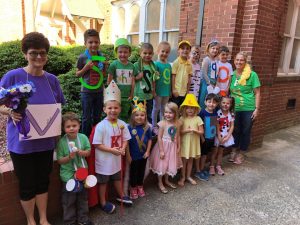
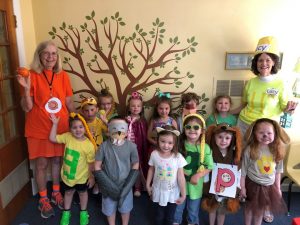
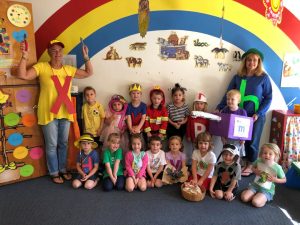
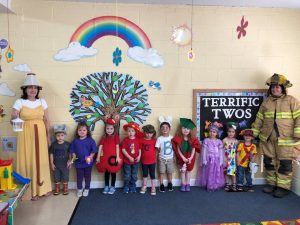
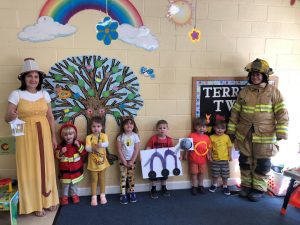
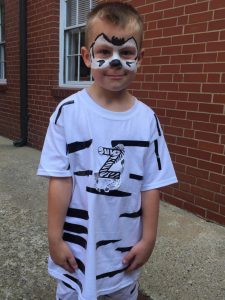

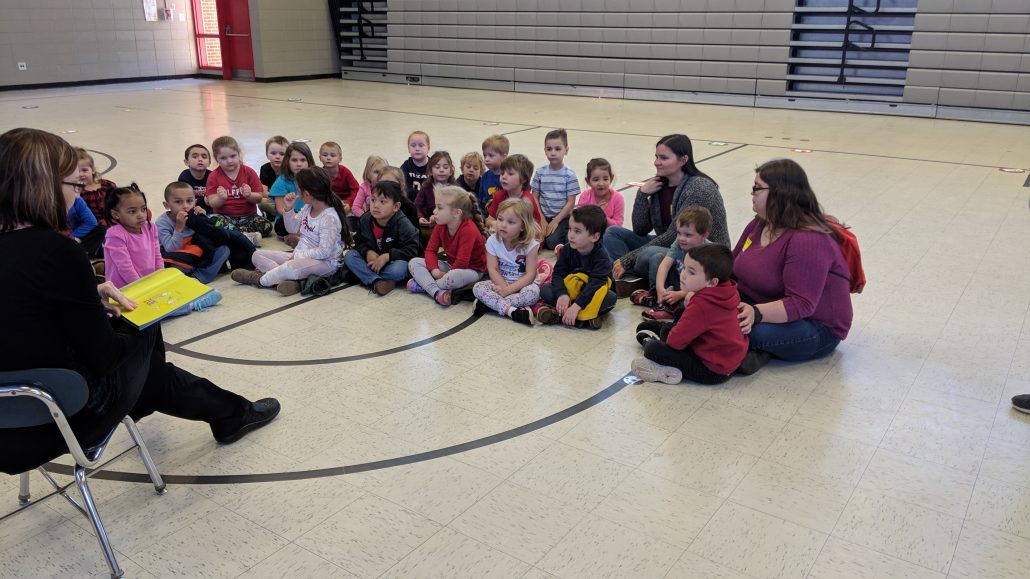

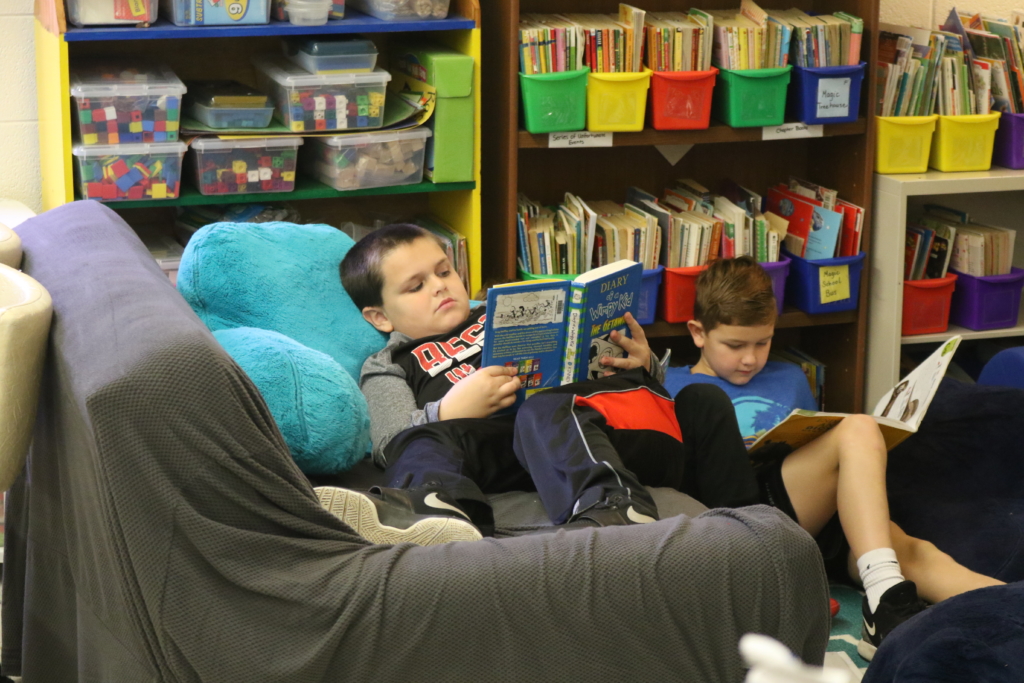







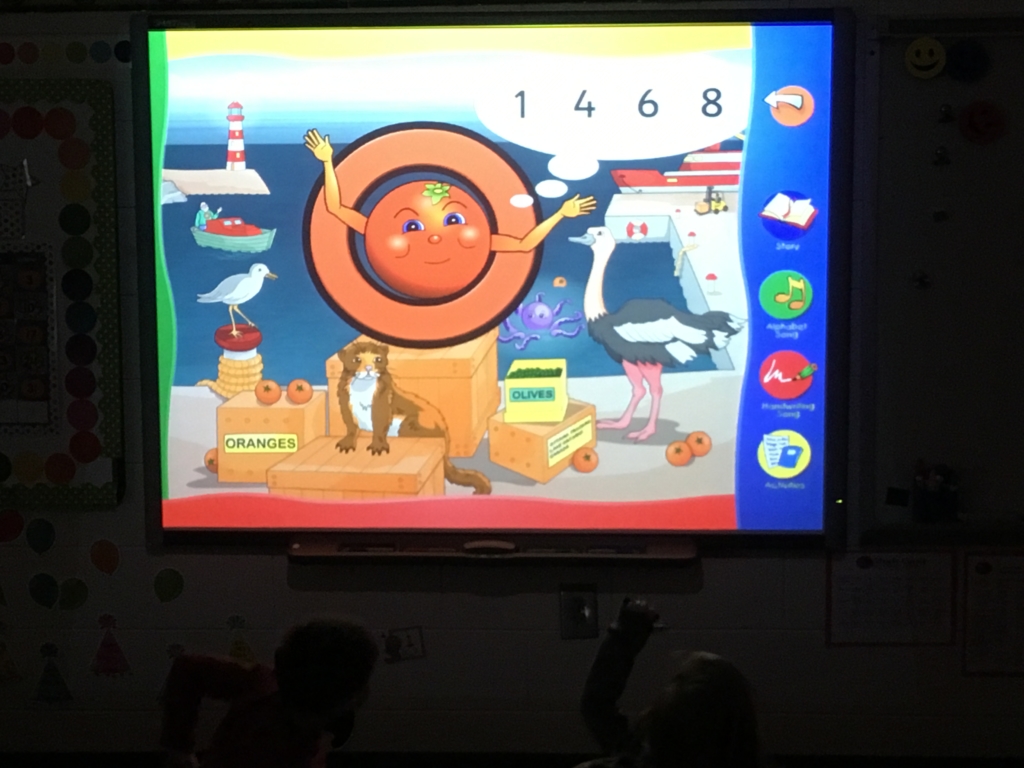









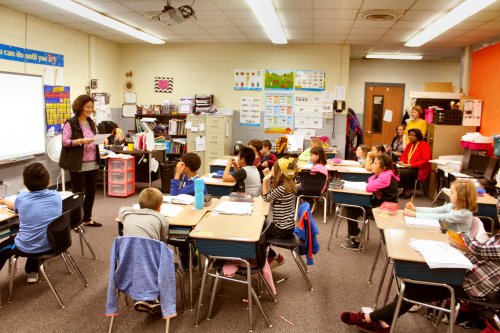 By Jeanna B. White
By Jeanna B. White


